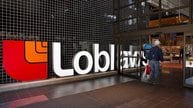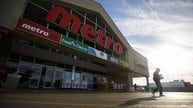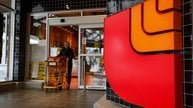Loblaw bolsters evil reputation by reporting huge profits as grocery prices skyrocket
MR.EVIL GALAN WESTON
Executives at Loblaw Companies Ltd. are likely celebrating today as the Canadian retail giant reports an enormous, stock price-boosting, 30 per cent increase in profits over last year at this time.
Those who aren't shareholders of the Loblaw's and Shoppers Drug Mart parent company (read: the vast majority of Canadian consumers) are more like, "wtf? seriously?"
It's been less than a month since the conglomerate's heir and CEO, Galen Weston Jr., sparked widespread ire with a tone-deaf email announcing a temporary price freeze on all No Name brand products.
Critics found it a bit ironic (if not enraging) that one of Canada's wealthiest people was acting like a martyr for lowering the prices of his already-inflated food products, and that his promotional email claimed the move was meant to "help make a meaningful difference to your grocery budget at a time when you may need it most."
It was Weston's assertion in that email that the fast-rising cost of groceries at Loblaw's was due to supplier costs and "maddeningly, out of our control." (Interestingly, a still-live version of that email blast has been retroactively amended to omit this line.)
Federal regulators have since begged to differ with the whole "out of our control" thing, launching an investigation into the high profits being reported by grocery store executives who keep arguing that consumer food prices are skyrocketing due to inflation.
Inflation has undoubtedly impacted grocery prices, but not as much as to justify the rate of price creep at Canada's largest supermarket chains (the same chains that intentionally fixed the price of bread for 15 years before getting caught in 2017.)
Not only do prices for specific items vary widely from store to store, even those under the same banner, the cost of these products have risen faster than actual inflation rates — some 9.7 per cent vs. 7.7 per cent as of this summer, per Statistics Canada.
"With inflation on the rise, Canadian consumers have seen their purchasing power decline. This is especially true when buying groceries. In fact, grocery prices in Canada are increasing at the fastest rate seen in 40 years," wrote the Competition Bureau of Canada when announcing a probe into grocery store profits last month.
"Many factors are thought to have impacted the price of food including extreme weather, higher input costs, Russia's invasion of Ukraine, and supply chain disruptions. Are competition factors also at work? To find out, the Bureau will study this issue from now until June 2023."
Are grocery magnates actually gouging consumers when food bank usage is at an all-time high? The bureau has yet to decide, but some analysts have argued that, yes, some items are being falsely marked up under the guise of inflation.
Whatever the case, Loblaw — which owns Loblaws, Shoppers Drug Mart, Real Canadian Superstore, No Frills, Joe Fresh, Zehrs and more — has really been raking it in.
In a financial release issued Wednesday, Loblaw Companies Ltd. reported that adjusted gross profits for retail had risen by 30.8 per cent in the third quarter of 2022, compared to Q3 2021.
"Loblaw's efforts to moderate cost increases and provide superior value to customers through its PC Optimum Program and promotions resulted in strong sales and stable gross margins in Food Retail," reads a release accompanying the earnings report.
"Sales were led by strong performance in Discount banners such as No Frills and Real Canadian Superstore, and a continued shift to private label brands including President's Choice and no name. In Drug Retail, revenues benefited from elevated sales of higher margin categories like beauty, cough and cold."
All in all, the corporation boosted its adjusted net earnings for common shareholders to $663 million, up $123 million year-over-year, representing an increase of 22.8 per cent.
Said Loblaw in a statement on Wednesday: "Today we provided clear evidence that we are not taking advantage of inflation to drive profit. While food costs and prices have increased, our mark up on food has remained flat over the past year."
The corporation can say what it wants about inflation and price gouging, but their evidence is anything but clear.
Loblaw, Metro pressuring food
suppliers as profit soars
Loblaw (L.TO) and Metro (MRU.TO) each reported growth in sales and profit on Wednesday and say they are pushing back against suppliers' continued price increases as food inflation remains high in Canada.
Loblaw, Canada's largest grocery retailer, saw total sales surge 8.3 per cent annually to $17.4 billion in the quarter ending Oct. 8, while its profit jumped 29 per cent to $556 million. Same-store food sales, a key metric in the retail industry that excludes sales at newly opened stores, increased 6.9 per cent in the quarter, while drug retail sales jumped 7.7 per cent.
Total sales at Metro in the quarter ending Sept. 24 grew 8.3 per cent annually to $4.4 billion, "mainly due to higher inflation in this quarter", the company says. Net earnings in the quarter increased 9.4 per cent to $219 million, when adjusted for the impact of an impairment charge related to withdrawing from the Air Miles loyalty program and the amortization of Jean Coutu intangible assets.
The rise in profit and revenue comes as food prices continue to run hot in Canada, raising the pressure and scrutiny on Canadian grocery retailers. Grocery store prices jumped 10.1 per cent year-over-year in October, Statistics Canada reported on Wednesday, a slight slowdown from the 41-year highs reported the month before.
'The company is not taking advantage of inflation'
Both Loblaw and Metro say they have faced increased costs from food distributors, but add that they are pushing back against price hikes.
"We have seen unprecedented cost increases from our suppliers this year and we continue to receive new cost increases," Loblaw chief financial officer Richard Dufresne said on a conference call with analysts following the release of earnings on Wednesday.
"Part of our job is to evaluate these and push back where they do not make sense. We have done that vigorously over the last two years and will continue to do so going forward. Our objective is to make sure that our (prices) on the shelf do not rise faster than supplier costs."
Loblaw reported a gross margin of 30.8 per cent in the quarter, up 10 basis points from the same quarter last year. Gross margin is the amount of profit made on goods measured as a percentage. The company said the increase was driven by sales in higher margin items like cosmetics and over-the-counter drugs. Dufresne said Loblaw's gross margin for food has stayed "essentially flat" as inflation has soared.
"This gives us the confidence to categorically say that retail prices are not growing faster than costs and the company is not taking advantage of inflation to drive profit," he said.
Metro reported a gross margin of 20.4 per cent in the quarter, and while it also did not disclose specific figures, it said food margins were down slightly while the pharmacy margins were up.
Metro's chief executive Eric La Flèche says that while inflation is expected to moderate, the outlook for prices remains uncertain as the company continues to receive requests from its suppliers for price increase in February.
"We're negotiating hard with our suppliers to mitigate that. We want them to justify that and we're pushing back because there is resistance for sure from customers," La Flèche said.
"If the vendors want to keep their volumes, the cost increases will have to moderate."
The Competition Bureau of Canada launched an investigation in October to study grocery store competition in Canada in the wake of soaring prices. The federal agriculture committee is also digging into grocery store profits, with testimony expected from the heads of the country's biggest grocery store chains, including Loblaw, Metro and Empire (EMP-A.TO).
With food prices soaring, both retailers said customers are increasingly turning to discount stores, such as Loblaw's No Frills and Metro's Food Basics.
"We're seeing a lot more Mercedes and Range Rovers in the parking lots in those (discount) stores than would have been the case before," chairman and president Galen Weston told analysts.
"Who knows how many of those customers will ultimately stay in the discount format, but that discount growth has been has been prevalent across our industry... the discount formats are successfully converting higher income customers."
La Flèche said the shift from conventional stores to discount brands is driving the company's sale growth, and that customers are increasingly turning to private label brands that feature lower prices.
Alicja Siekierska is a senior reporter at Yahoo Finance Canada. Follow her on Twitter @alicjawithaj.
'Mercedes and Range Rovers:' Loblaw's discount chains attract higher-income shoppers
Brett Bundale, The Canadian Press
Nov 16, 2022
"We're seeing a lot more Mercedes and Range Rovers in the parking lots in those (discount) stores than would have been the case before," chairman and president Galen G. Weston told analysts during a conference call to discuss the grocer's latest results.Sign up to get breaking news email alerts sent directly to your inbox
"The discount formats are successfully converting higher-income customers."
His comments came as Loblaw reported its third-quarter profits rose about 30 per cent compared with a year ago.
The grocery and drugstore retailer said its net earnings available to common shareholders totalled $556 million for the quarter ended Oct. 8, up from $431 million in the same quarter last year, while revenue climbed to $17.39 billion in the quarter, up from $16.05 billion in its third quarter of 2021.
Food retail same-store sales rose 6.9 per cent, led by the grocer's discount banners, including No Frills and Real Canadian Superstore.
"Performance in our discount banners continued to strengthen as market share and traffic improved year over year," Loblaw chief financial officer Richard Dufresne told analysts.
"We continue to see a larger share of wallet spend in our discount banners."
The grocer also noted a continued shift to private-label brands like President's Choice and No Name.
Loblaw has recorded "an enormous amount of new trial" of customers buying its No Name brand, Weston said.
"I don't know what it was like in the 1980s but certainly in my time in the business I haven't seen this kind of growth in an opening-price-point brand ever," he said. "It's pretty significant."
One of the key drivers of No Name sales is the brand's broad assortment, including in the produce aisle where inflation has been acute, Weston said.
Meanwhile, the President's Choice brand is also growing, though not at the same rate as No Name, he said.
In September, the price of food purchased in stores rose 11.4 per cent compared with a year earlier, the fastest pace since 1981, Statistics Canada said.
The agency said Wednesday the price of food from stores in October was up 11.0 per cent compared with a year earlier, a somewhat slower clip than the previous month, but still the eleventh consecutive month where groceries increased at a faster rate year over year than the overall consumer price index.
Loblaw said Canadian retail food inflation remained among the lowest of G7 countries but that "global inflationary forces continued to increase the cost of food in the quarter" and that it continues to field new cost increases from suppliers.
"We are largely dependent on what suppliers ask us to pay for their products," Dufresne said. "Suppliers determine the cost and we determine the retail prices."
Dufresne added: "Our objective is to make sure that our price on the shelf does not rise faster than supplier costs."
Loblaw tracks its margins closely, he said, and every quarter since inflation took off last summer the company's food gross margins have been essentially flat.
"This gives us the confidence to say categorically that retail prices are not growing faster than costs and the company is not taking advantage of inflation to drive profit," Dufresne said.
On an adjusted basis, Loblaw says it earned $2.01 per diluted share, up from an adjusted profit of $1.59 per diluted share a year ago.
Analysts on average had expected a profit of $1.96 per share and $16.85 billion in revenue, according to estimates compiled by financial markets data firm Refinitiv.





No comments:
Post a Comment